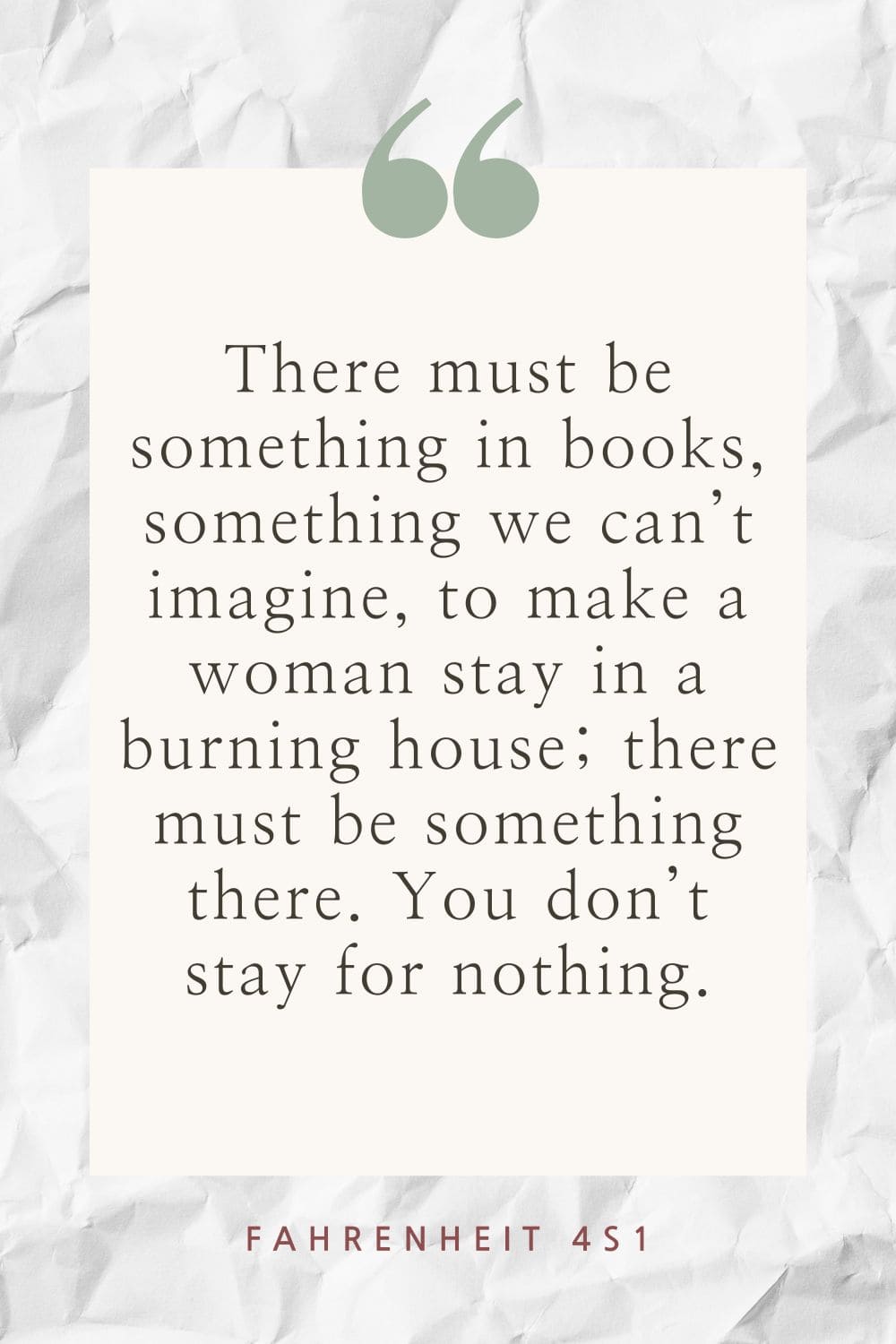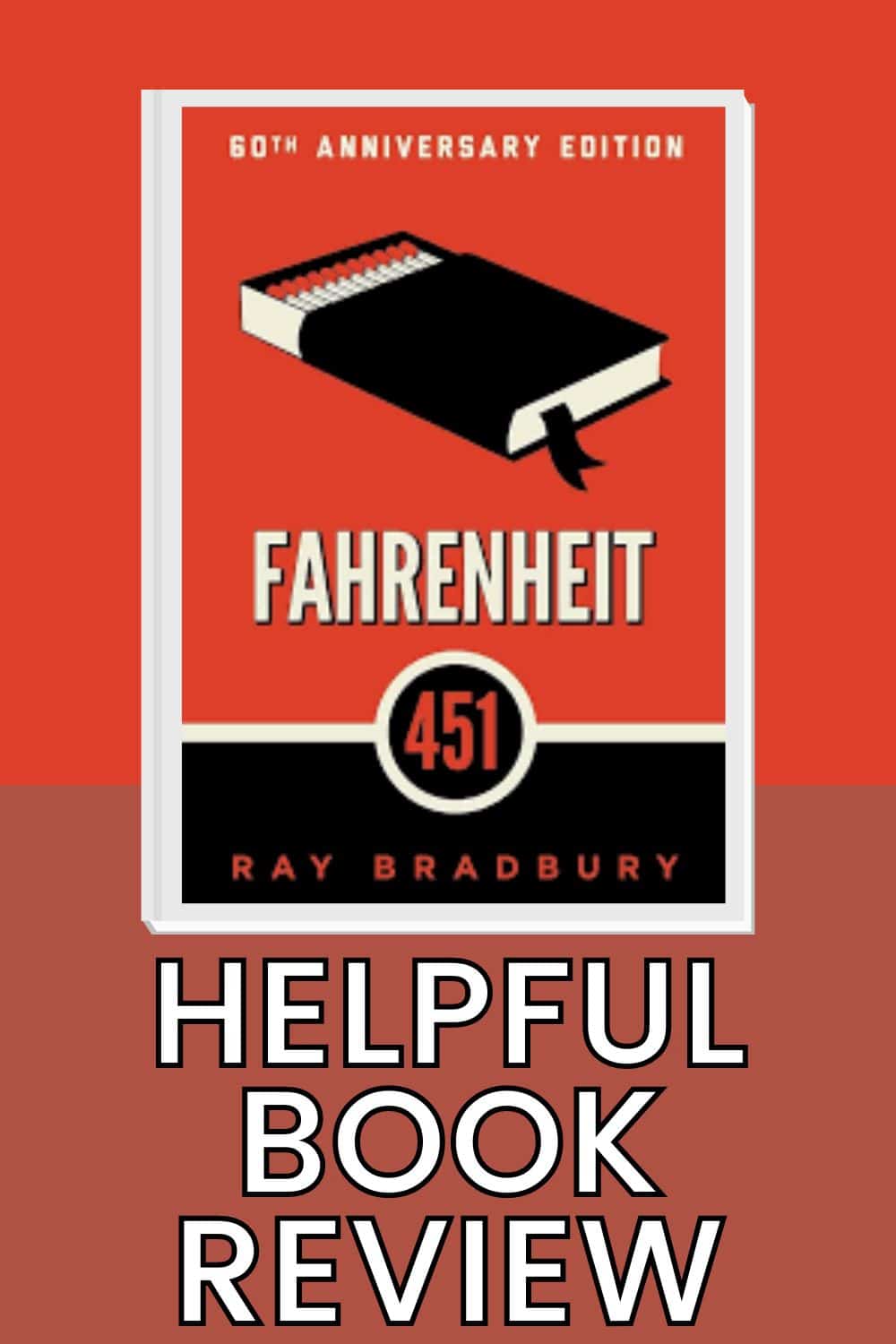This book review of Fahrenheit 451 offers a thoughtful analysis of this dystopian novel’s controversial themes. Ray Bradbury advocated against book bans and the reliance on technology. You’ll discover why this still rings true today, several decades after he first published it in 1953. Let’s get literary!

Quick Book Review of Fahrenheit 451
- Age Rating/Grade Level: 13+ (but best for high school students and adults)
- Publication Date: 1953
- Genre: dystopian fiction, science fiction, classic book, banned book
- Page Count: 180
- My Review: ★★★★☆
Fahrenheit 451 is set in a dystopian future where books are banned, and “firemen” burn any found. The story follows a fireman named Guy Montag as he questions the anti-book society he works for and seeks to understand the value of knowledge and individual thought.
Read More: Summary of Fahrenheit 451
I have now read Fahrenheit 451 three times (twice on audio and once in print) as part of my challenge to read the books referenced on Gilmore Girls and my desire to fight censorship.
Fahrenheit 451 is a quick read but a difficult one. It presents a science fiction narrative that the reader must think more deeply about.
Fahrenheit 451 is a culturally significant novel, popular for offering messages on the value and importance of books and intellectual freedom to the individual and society. It also makes a statement on the dangers that technology poses to society and human relationships.
Fahrenheit 451 is likewise a controversial book banned because it was said to have graphic content, including violently overthrowing the government. However, underlying these bans of Fahrenheit 451 is the desire to prevent independent thinkers and disenfranchised voices from gaining knowledge and power.
Indeed, Bradbury’s main messages in Fahrenheit 451 about the dangers of censorship continue to resonate strongly today. Books are being banned in the United States at alarming rates, often for their inclusion of diversity. When literature filled with independent thought and ideas is controlled, so is the ability to have everything from empathy to personal growth, individuality, creativity, and even freedom.
In fact, Bradbury himself has said:
“There is more than one way to burn a book. And the world is full of people running about with lit matches.”
Reading Tip: I recommend reading the audiobook edition narrated by Academy Award-winning actor Tim Robbins. He’s an exceptional narrator as protagonist Guy Montag.
Critical Analysis of Fahrenheit 451
In Fahrenheit 451, Ray Bradbury clearly argues that only books can foster independent thinking that promotes everything from empathy to self-discovery and innovation. Bradbury was ahead of his time in 1953, including several plot points about the harm technology would cause in his narrative.
As protagonist Guy Montag embarks on his journey of enlightenment from book burner to book preserver, it is his wife, Mildred, whose obsession with technology and, in turn, her disengagement from reality make it clear that technology is a culprit. Glued to her earplug radio and massive television screens, Mildred’s life bears no discernable happiness: she’s alienated, isolated, easily manipulated, forgetful, apathetic, and even suicidal.
Sound familiar? It’s no secret that smartphones and their addictive properties have made millions of “Mildreds” out of us today. And the faster it continues to move, the more we stand to lose. Somehow, Bradbury perfectly captured the feeling of short-form videos on social media today in this snippet:
“Speed up the film, Montag, quick. Click, Pic, Look, Eye, Now, Flick, Here, There, Swift, Pace, Up, Down, In, Out, Why, How, Who, What, Where, Eh? Uh! Bang! Smack! Wallop, Bing, Bong, Boom! Digest-digests, digest-digest-digests. Politics? One column, two sentences, a headline! Then, in mid-air, all vanishes!”
Read More: Quotes From Fahrenheit 451
Recently, while taking my own social media detox challenge, I was forced to dig in and grapple with the questions Clarisse asked Montag, like whether he was happy.
Of course, he wasn’t, and neither was I. While I attempted to cling to the benefits of technology (of course, influenced by its addictive properties), I had to admit they didn’t outweigh the disadvantages. I felt overwhelmed and insufficient every time I logged on.
So, what about books make for a happy society, then? According to Bradbury in Fahrenheit 451, they force us to slow down and think. And when we think, we grow intellectually, spiritually, and emotionally. This growth fosters human connection and meaningful living. Diversifying literature enables people of all different subtypes to feel seen, understood, and capable.
Given Brandbury’s warnings, why are books still being banned (and at absolutely exorbitant rates in the United States)?
An enlightened society can feel scary, especially to people who like the status quo. This can often be those who have reaped the rewards of societal power. As disenfranchised voices speak louder, people are also faced with examining their own mistakes and shortcomings, which feels bad.
Quite frankly, many people prefer to think and do less and have everything remain the same, then call it happiness.
It’s no small task to change the minds of those banning books at record rates today. As Bradbury said in Fahrenheit 451:
“They have to come round in their own time, wondering what happened and why the world blew up under them. It can’t last.”
In the meantime, it’s up to book lovers like Granger and independent spirits like Clarisse to encourage them to wonder, as Montag did:

Read More: Quotes About Banned Books
Fahrenheit 451 Adaptations: Videos to Watch
Watch the trailer for the 1966 adaptation on YouTube. Or, watch the trailer for the 2018 adaptation starring Michael B. Jordan:
About Fahrenheit 451 and Ray Bradbury
about

Authored by Ray Bradbury in the mid-20th century, Fahrenheit 451 is a powerful critique of a dystopian society where books are outlawed. It was inspired by Nazi book burnings and the Soviet Union’s governmental control.
Fahrenheit 451 has won awards that include the American Academy of Arts and Letters Award in Literature in 1954, the Commonwealth Club of California Gold Medal, the Prometheus “Hall of Fame” Award in 1984, and the “Retro” Hugo Award in 2004 for the best novel of 1953. It’s also been adapted for both film and stage.
Final Thoughts
To conclude this book review of Fahrenheit 451, I hope you take away a chilling warning about the dangers of a society devoid of critical thinking and intellectual curiosity.
This novel urges us to reevaluate our relationship with knowledge, censorship, and the importance of preserving our freedom of thought. It is a must-read today for anyone and everyone concerned about the dramatic rise in banned books.

remember, it’s a good day to read a book. – jules


